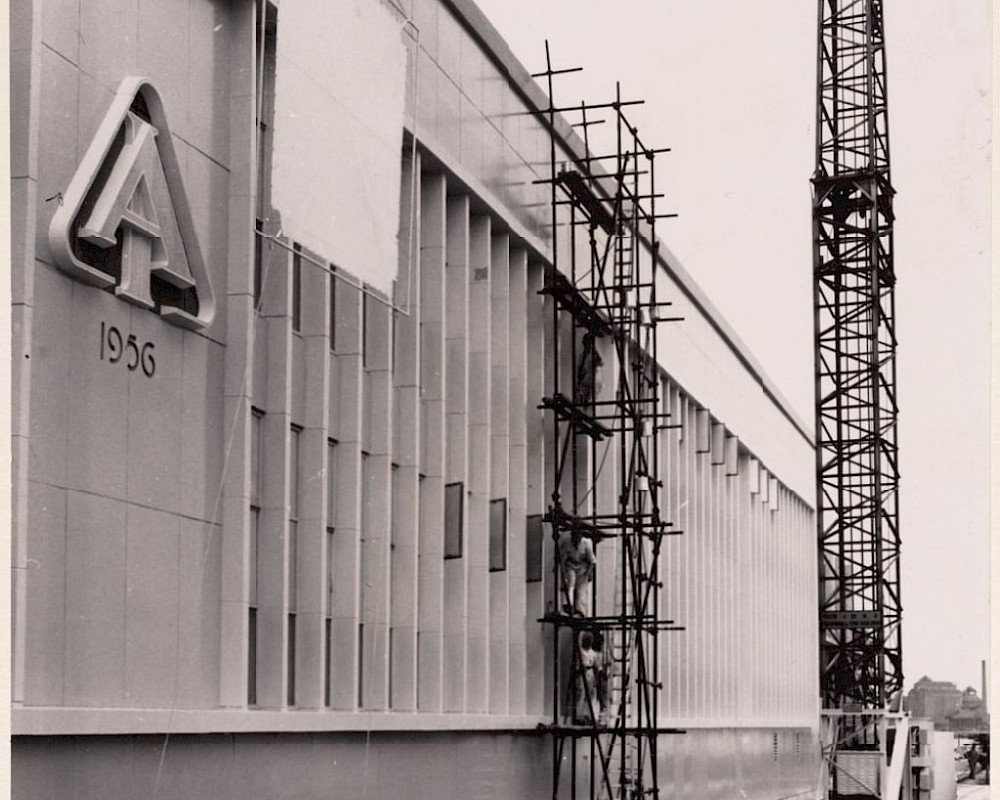Remco Torenbosch: Artillerie Inrichtingen, Bandung (1923-1950), 2024
Central to this online installation are five digitized glass negatives of the Artillerie Inrichtingen arms and ammunition factory in Bandung, Indonesia, taken by Dutch photographer Wijnand Elbert Kerkhoff. Kerkhoff worked in Java from 1919 to 1932 during the Dutch colonization of Indonesia. During this period, in addition to his famous landscape photography and images of traditional Javanese rural life, he produced these five corporate photographs commissioned by the arms and ammunition factory Artillerie Inrichtingen in Zaandam - the industrial site where Het HEM is located today.
In 1912, Artillerie Inrichtingen Zaandam became a state company, removing it from direct military authority. With the KNIL (Royal Dutch East Indies Army) as its largest customer, most of its products were exported to the Dutch East Indies to suppress uprisings by the local population, such as during the Atjeh War. This led to the necessary scaling up of arms production. To also shorten the production line, Artillerie Inrichtingen opened a second factory in Bandung from 1923 to 1950. During this period, the organizational form was changed to a joint-stock company and company management was given more “freedom of action” without state interference.
The five photographs from this particular period for both Wijnand Elbert Kerkhoff and the Artillerie Inrichtingen expose the different interests of Dutch colonization. First, they underscore the political economic importance that military repression in Indonesia had on the survival of the Dutch colony. In addition, these photographs also reveal the economic importance of the survival of the Dutch arms industry that grossed through colonization. This was intertwined with the perversity of endless Dutch pragmatism and economic thinking in order to defend revenues and maintain power.
This online installation explores the relationship between image and the political and economic influence on representation. It is not necessarily about what is on display; equally important in this context is what is not. The five photographs are the only documented evidence known of this arms and ammunition factory. They show mostly Javanese men at work alongside large quantities of ammunition and weapons and their Dutch supervisors. The observant viewer knows the perverse conclusion: these weapons will eventually be used against their own people. Therefore the photographs do not depict direct violence, but reveal the production of this horror.
After both the Japanese occupation and the independence of Indonesia that was not recognized by the Netherlands until 1949, Artillerie Inrichtingen was transferred to the Indonesian military by the Dutch government in 1950. The nationalized Indonesian military industrial grew into today's multi-million dollar company PT Pindad. PT Pindad calls itself the largest arms manufacturer in Southeast Asia. The state-owned company supplies several countries in the region, in Africa and the Middle East. In 2022, it was reported that PT Pindad sells arms to Myanmar's military regime, which is held responsible for the Rohingya genocide and the junta's campaign of terror.
Following Indonesia's independence, the fall of the wall in 1989 and the relaxation between East and West Europe, orders for the Dutch ammunition maker declined rapidly. The Dutch branch of Artillerie Inrichtingen in Zaandam turned a loss despite several takeovers and name changes. Although the Netherlands had historically supplied arms and ammunition to Israel for as many as four wars, since the scaling back of domestic orders, the Dutch defense bought its ammunition from Israel with never providing offset orders for this Dutch company. Artillerie Inrichtingen (later renamed to Eurometaal) closed its doors in 2003 after 324 years of existence.
Torenbosch came across these not yet digitized glass negatives during a research in the collection of Wereldmuseum Rotterdam / Nederlands Fotomuseum in Rotterdam, which manage the oeuvre of Wijnand Elbert Kerkhoff. For this occasion, these glass negatives have been digitized in high resolution, making them accessible for a wider audience and research purposes. Apart from this online installation made specifically for the The Couch (the digital platform of Het HEM), this photo installation will also appear in a physical constellation in the near future.
Credits: © Wijnand Elbert Kerkhoff, collection Wereldmuseum Rotterdam / Nederlands Fotomuseum

essay
The innocent arms factory of Wijnand Elbert Kerkhoff
Rust, reinheid en regelmaat (peace, cleanliness, and regularity): the order and balance in both architecture and image make the arms factory on Bandung 'beautiful'.
About Remco Torenbosch
In his films, publications and installations, Remco Torenbosch (1982) studies and questions the interrelationship between political and economic systems. Within this realm, he conducts in-depth research that focuses on a wide range of topics, including the complex dynamics of the global economy, the structural violence that permeate neoliberal capitalism, and the geopolitical power dynamics that arise from them. Torenbosch studied at the Universität der Künste Berlin, Willem de Kooning Academy Rotterdam, and is an alumnus of the Rijksakademie Amsterdam. His work has been exhibited at: Kunsthaus Zürich, Kunsthalle Wien, Victoria and Albert Museum London, Stedelijk Museum Amsterdam, Fondazione Antonio Ratti Como, De Appel Amsterdam, GAMeC Bergamo, among others. In 2013 he was shortlisted for the Prix de Rome. He has been a lecturer at several institutions including: Yale School of Art New Haven, ArtCenter Pasadena, IULM University of Milan, among others. Torenbosch currently lives and works in Amsterdam, The Netherlands and Basel, Switzerland.
About Zippora Elders
Zippora Elders is the former Head of Curatorial Department & Outreach at Gropius Bau in Berlin. Previous posts include Sonsbeek in Arnhem, Kunstfort bij Vijfhuizen, The Performance Show at Art Rotterdam, Foam Photography Museum and Stedelijk Museum Amsterdam. As an art historian and writer, Elders has curated numerous solo and group exhibitions and contributed to several publications. Living and working from Berlin, she advises, juries and supervises international organizations and platforms on art and culture.
The child of a Moluccan father and Indo-Dutch mother, Elders occasionally writes professional and personal reflections on the art world in relation to the knowledge and experiences drawn from these cultural backgrounds and communities.